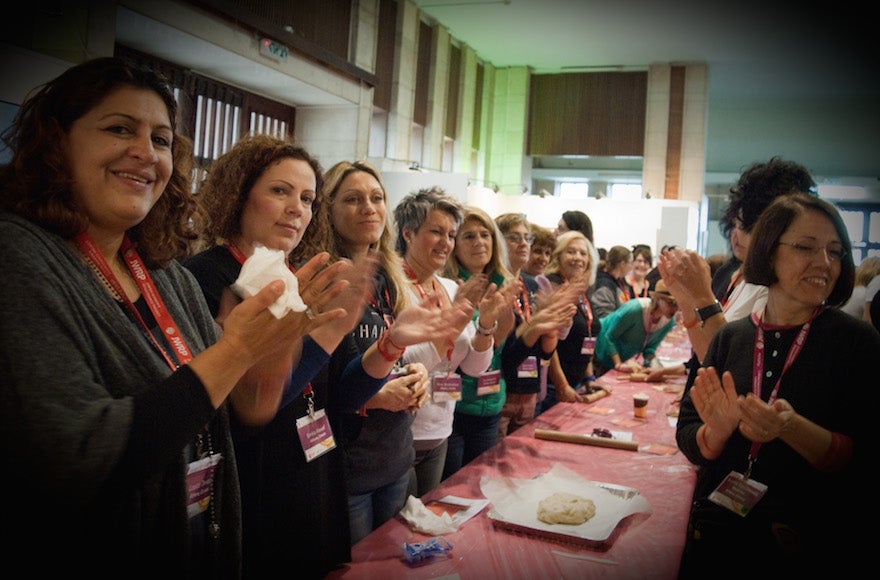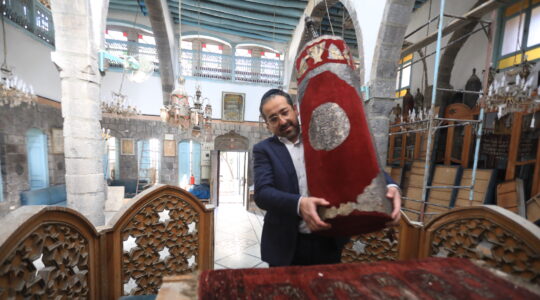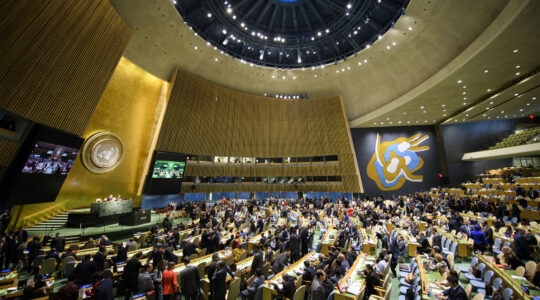ATHENS, Greece (JTA) — Amid preparations for her wedding 12 years ago, Errika Abouaf was happy to skip the mikvah, the ritual bath where Jewish brides traditionally undergo immersion before marrying in an Orthodox ceremony.
Her excuse for opting out was that her tiny Jewish community of Larissa in northern Greece has no mikvah.
“But it’s also because I didn’t feel like doing it,” said Abouaf, who now lives in Athens with her son and husband. “I felt an aversion of some kind.”
It’s a common sentiment in a country where 87 percent of Jews were murdered during the Holocaust. Members of Greece’s present-day Jewish community of 5,000 perceives its Jewish identity as mostly cultural and independent to religion, community leaders say.
But Abouaf changed her outlook last year after visiting a mikvah for the first time in Israel as part of the Jewish Women’s Renaissance Project. The group, founded in 2008, runs subsidized, weeklong trips to Israel that aim to bring non-observant Diaspora women closer to Jewish practice — a so-called “Birthright for moms.” Thousands of women have participated in the trips, with each one bringing together about 400 women.
“The trip changed me and my fear of Judaism,” Abouaf said.
The excursions are popular in Jewish communities from Sydney to San Francisco for what participants describe as a bonding and empowering experience for women — not to mention the welcome break it provides from the grinding routine of parenting. But they seem to have a particularly strong effect on women from small, crisis-stricken communities where mothers face a growing uncertainty over the viability of raising their children as Jews.
“Turkish Jews don’t have many options to choose from for Israel trips; this is not New York,” said Suzette, a mother of two and an organizer of Renaissance trips in Istanbul, who requested her last name be withheld for security reasons. “When we do go to Israel, it’s for family visits. A group visit to Israel, to really connect to the country, is very rare and meaningful.”
Abouaf visited Israel last year as one of 15 Greek participants in a Renaissance trip with women from various countries. She had visited Israel twice before but saw little of the country, as both trips were to undergo training for her volunteer position as a Jewish community guard. The Western Wall brought her to tears, but the hugs from other women in her group proved no less powerful.
“They didn’t ask what’s wrong, just hugged all the time that day,” Abouaf recalled.
In addition to connecting to Jewish sites and traditions, Abouaf said she was also scoping out the country as a possible alternative to Greece, where rising political extremism and the lingering effects of a financial crisis are major concerns.
According to a 2015 Anti-Defamation League survey, Greece is the most anti-Semitic country in Europe, with 67 percent of the population harboring anti-Semitic sentiments. It is also the only European country with parliamentary representation for a far-right party, Golden Dawn, whose rhetoric echoes that of Nazi Germany.
Golden Dawn, whose flag features a variant of the swastika against a red background, has 18 seats among the 300 in the Greek parliament, and its leaders have inveighed against Jews. The party’s main spokesman, Ilias Kassidiaris, sports a swastika tattoo, and Christos Pappas, the second highest-ranking official, said in 2014 that Greeks are the “eternal enemies” of Israel.
“I don’t see a future for Elias here,” said Abouaf of her 10-year-old son, who attends the only Jewish school in this city, the Greek capital. “When I was in Israel with the Renaissance project, I was looking at the country for the first time to see whether I could live there, what would my family do here.”
Lori Palatnik, the founding director of the Jewish Women’s Renaissance Project, said the trips play a vital role in supporting communities facing rising anti-Jewish sentiment.
“Bringing women from countries like Turkey and Greece, which struggle with renewed anti-Semitism, is critical in keeping the strength of those Jewish communities alive,” Palatnik said.
The trip is designed primarily for women who do not observe Shabbat, though some participants said their application was approved even though they do observe. Most participants are not observant and the project, which has ties to the Jewish outreach organization Aish Hatorah, aims to bring that group closer to Judaism, organizers said.
In Greece, the project is run by Nechama Hendel, a France-born emissary of the Chabad Hasidic movement who recently participated, along with Abouaf and several other women, in a bread-baking festival in Athens. The women prepared challah that they learned to make during a workshop in Israel.
“Everyone from the Turkish Jewish community has been to Israel, but rarely in a group,” said Betty, one of two volunteers who helped organize the trips in Turkey. “We don’t have the wealth of study groups, missions and delegations to Israel that go to Israel from America. So this is a rare opportunity for us to strengthen our attachment both to Israel and among ourselves.”
Betty and Suzette are unusual in their community because, unlike most Turkish Jews, they observe the Sabbath. Still, the trip to Israel strengthened Suzette’s resolve to observe the day of rest despite the temptation to violate religious laws by watching television or driving a car.
Trips to Israel are an expensive treat for the Jews of Turkey, where the average monthly salary is only $430. All expenses for the Renaissance trips are covered except for flights.
The trips for Jews in “smaller Jewish communities like Greece and Turkey have the potential to affect their future dramatically,” said Dvir Kahana, director general of Israel’s Ministry of Diaspora Affairs, which helps fund the trips.
Aware of the “big challenge to maintain Jewish life outside Israel and especially in small communities,” he said, Israel is “proud to give women from different backgrounds and places this remarkable opportunity to strengthen their Jewish identity … [and] transfer this to their children.”
JTA has documented Jewish history in real-time for over a century. Keep our journalism strong by joining us in supporting independent, award-winning reporting.






